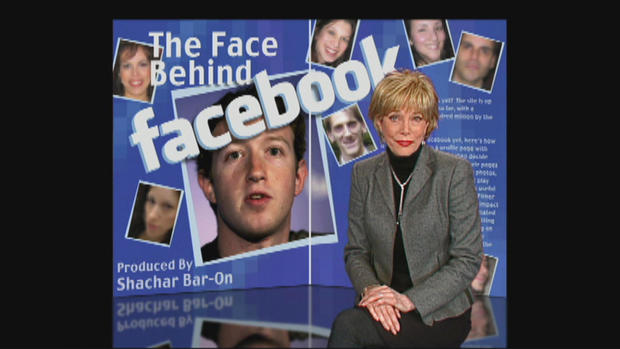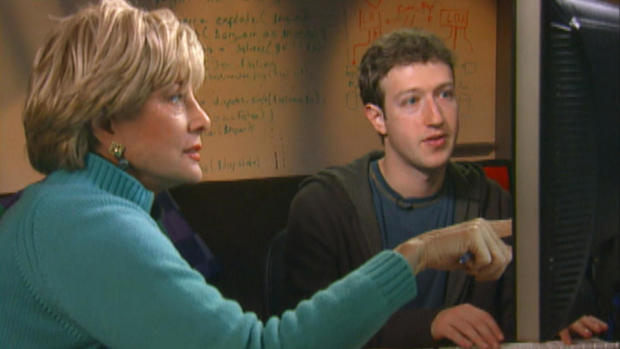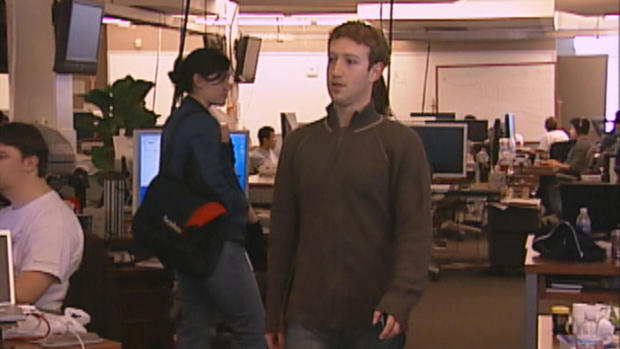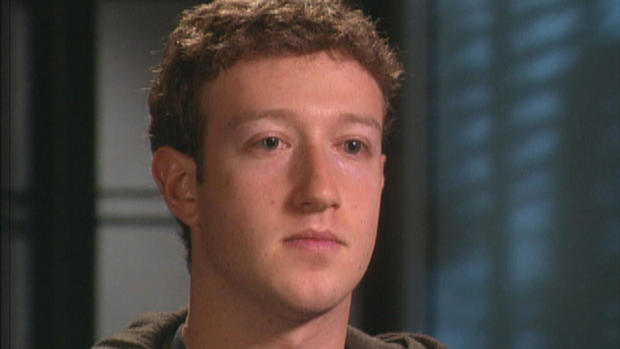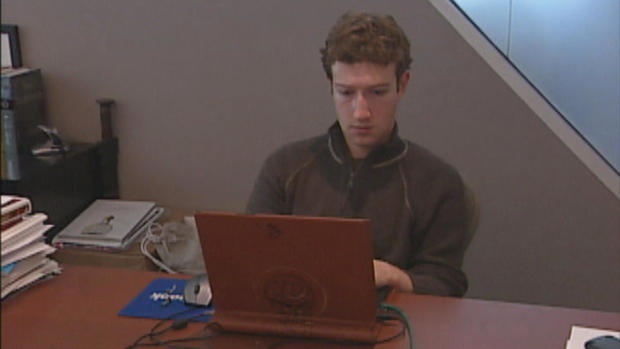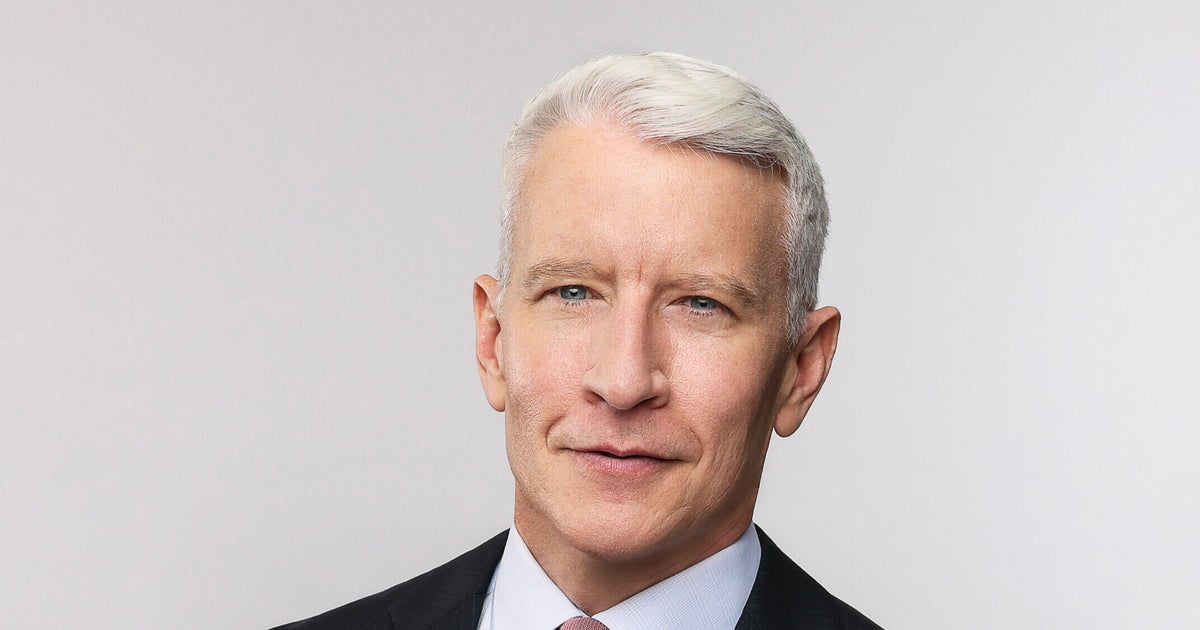Facebook at 15: Mark Zuckerberg in 2008 on Facebook's political power, ad targeting
Editor's Note: As Facebook turns 15, 60 Minutes looks back at Lesley Stahl's 2008 profile of founder Mark Zuckerberg. At that time, Zuckerberg was just 23 years old and Facebook had 60 million users. Since then, Zuckerberg has watched the social network he created in his Harvard dorm room amass over 2 billion users, impact presidential elections and spark privacy and data-sharing concerns. The following is a transcript from Stahl's 2008 story.
Are you on Facebook yet? The site is up to 60 million users so far, with a projection of 200 million by the end of the year. If you're not on Facebook, here's how it works: you set up a profile page with details about yourself and then decide who gets to see it. Friends use their pages to share personal news, exchange photos, team up on political causes, or just play long-distance Scrabble. It can be a useful tool or an addictive waste of time. Either way, Facebook is having a dramatic impact on the World Wide Web and it's estimated to be worth $15 billion. Sitting atop this growing company, directing an Internet revolution is a young, geeky computer programmer who created the site only four years ago.
This is the face of Facebook, Mark Zuckerberg, the mogul who's guiding its extraordinary growth. What everyone wants to know is, is he old enough to be running a company some people say is the biggest thing since Google.
Lesley Stahl: Tell everyone how old you are.
Mark Zuckerberg: I'm 23 right now. So that...
Lesley Stahl: And you're running this huge company.
Mark Zuckerberg: It's not that big.
Lesley Stahl: You're 23!
And here he was helping me set up my own Facebook page with a profile of my likes and dislikes.
Lesley Stahl: Guess what my favorite TV show is.
Mark Zuckerberg: I can't.
Lesley Stahl: All right. Put 60 Minutes there.
Next, we added my friends, family--that's my son-in-law--old classmates. Within a few minutes, I got a friend request.
Lesley Stahl: Here's a guy I haven't talked to in two years, and I'm so thrilled to hear from him. Mark...
This is why so many find the site addictive. In a world with no cell phone or e-mail directories, Facebook has become a way to find lost friends.
Mark Zuckerberg: It used to be the case, like, you'd switch jobs, and then maybe you wouldn't keep in touch with all the people that you knew from that old job.
Lesley Stahl: Right.
Mark Zuckerberg: Just because it was too hard. But one of the things that Facebook does is it makes it really easy to just stay in touch with all these people.
Of course, if someone tries to friend you, you can ignore them. And privacy settings allow you to deny access to your page, say to your boss or your parents.
Good afternoon, Facebook. How may I help you?
Facebook headquarters in downtown Palo Alto looks like a dorm room. The 400 employees, who get free food and laundry, show up late, stay late, and party really late. Zuckerberg, who's made the cover of Newsweek and is reportedly worth $3 billion, sits at a desk like the other software engineers writing computer code.
Lesley Stahl: Have you changed your lifestyle? You don't look like you're buying really expensive clothes?
Mark Zuckerberg: No, I'm not buying really expensive clothes. No.
Lesley Stahl: Are you buying things? Are you buying things that you would...
Mark Zuckerberg: No. I have a little like one-bedroom apartment with a mattress on the floor. That's where I live.
Lesley Stahl: It's almost like a Disney movie.
Kara Swisher: Right.
Lesley Stahl: Twenty-three-year-old kid takes over major company.
Kara Swisher: Right. Right.
Kara Swisher, who used to write about Silicon Valley for The Wall Street Journal and now has a blog, "All Things Digital," has called him "The Toddler CEO."
Lesley Stahl: What do you think it's done to him as a person, to be 23 years old...
Kara Swisher: I think it's hard. I think when all of a sudden you're the smartest person in the world and you're the meal ticket for everybody, and this is the big hit. This is the new--this is the new Google at this point. And so Mark is under a lot of pressure because everybody wants something from him.
Like the founders of Google, Larry Page and Sergey Brin, Mark Zuckerberg is looked up to in Silicon Valley as a visionary.
Lesley Stahl: You seem to be replacing Larry and Sergey as the people out here who everyone's talking about. You're just staring at me.
Mark Zuckerberg: Is that a question?
We were warned that he can be awkward and reluctant to talk about himself. So we turned for help to his Facebook page, which says he's a Harvard alum.
Lesley Stahl: You're not a Harvard alum.
Mark Zuckerberg: That's true. We don't have a setting for dropout. No.
"I think because politicians can communicate with tens of thousands of people at the same time, it's pretty effective for them in campaigning."
He dropped out of Harvard in 2004 where he was intending to study psychology. His mom is a psychiatrist. Here she is on Facebook. His dad's a dentist. Mark was a computer whiz early on, writing software in sixth grade. In his second year at Harvard, he built a site where students could rate or berate the looks of classmates through ID photos he lifted off Harvard's computers.
Lesley Stahl: You got into deep trouble from this little prank.
Mark Zuckerberg: Yeah, well, Harvard was just not happy that I was using their images and...
Lesley Stahl: Yeah, well they said you hacked...
Mark Zuckerberg: Mm-hmm.
Lesley Stahl: Did they punish you?
Mark Zuckerberg: Yeah, I was put on some sort of--I don't know what you call it.
Lesley Stahl: Probation?
Mark Zuckerberg: Sure.
Soon thereafter, he and his two roommates created an online version of the Harvard student directory where kids could message each other. They called it "The Facebook" and launched it from their dorm room. Within four months, they had expanded to 40 colleges, and over the summer, moved to Palo Alto. But Mark had done code writing for some upperclassmen with a similar idea and they have filed a lawsuit.
Lesley Stahl: Three Harvard students are suing you, claiming that you stole their idea for Facebook.
Mark Zuckerberg: Well, I mean, we knew that we didn't steal any ideas or code, so we're just kind of waiting until that comes out in court.
Lesley Stahl: In the lawsuit, they claim that you were duplicitous. Are you worried about it?
Mark Zuckerberg: No, I don't really spend a whole lot of my time worrying about that. I mean, we have lawyers at the company who deal with that stuff. And it's just--it's not a huge concern. I mean, probably about half my time is spent on business operation type stuff.
Despite his young age, Zuckerberg seems to have made one savvy business decision after the next. He expanded access to Facebook from college students to high schoolers. Then in 2006, to adults, his fastest growing demographic. Now he's inviting everyone on the site to create new software and pocket the profits themselves. It's a way to keep the next big thing on Facebook. New programs emerge daily like Facebook Scrabble.
Mark Zuckerberg: I actually have a couple games going on now with my grandparents. So they got on Facebook, and we started playing Scrabble together.
So Facebook is changing the way we communicate with our friends and with our grandparents. It's also changing politics. Every major candidate has a page. Zuckerberg says there seem to be more Republicans on the site than Democrats. And among them, Barack Obama with his young persons following, is hugely popular. Hillary Clinton is hugely unpopular.
Lesley Stahl: You know, it used to be, first, you went on "Face the Nation" if you were a candidate; then well, no, you went on "Letterman." Now it seems the candidates have to be on Facebook. Are you changing the way candidates are running for president?
Mark Zuckerberg: Well, I think because politicians can communicate with tens of thousands of people at the same time, it's pretty effective for them in campaigning.
Facebook is growing so quickly, there's talk of it becoming a giant-slayer.
Lesley Stahl: Is Facebook a challenge to Google?
Charlene Li: I think they are.
Charlene Li, an analyst at Forrester Research, a technology consulting company, says Facebook is a threat to Google because it could become the first site people go to to search. Say you want information about a family vacation in Maui. Li says when you check Google, you could get a list of almost 200,000 hits.
Charlene Li: Versus I can go on Facebook, I can go and ask my friends, and people will write back to me, 'Oh, I've done things, and this is what I recommend, and, knowing you and your kids, they will really like doing this.' So, the next time I do something very specific like that, chances are I'll probably go to Facebook.
Which is why Yahoo! offered by buy Facebook in 2006 for $1 billion in cash. Zuckerberg declined. But then Microsoft swooped in and bought 1.6 percent of the company for $240 million. That meant that Bill Gates valued Facebook at $15 billion, roughly the same as Ford or CBS. Some analysts say that's wildly unrealistic, since Facebook has yet to figure out how to make money off its huge audience.
Lesley Stahl: Is it true that you don't make that much money?
Mark Zuckerberg: I think that's a pretty relative thing. But, I mean, as a private company, we just have the advantage of not necessarily having to report to the outside world all of our financials.
He may duck the question, but there's no getting around the fact that Facebook needs to find a way to generate revenue. And so Zuckerberg is experimenting with ads, trying to cash in on his users' own recommendations. Say you write on Facebook that you like a certain movie. That's turned into an ad. Or maybe you like a scarf from Bloomingdale's.
Mark Zuckerberg: So this isn't an ad that's going to go to a lot of people. Basically, when you put that information in your profile that you bought a scarf and that you like that scarf, or that's something that your friends might find interesting, right? So, what we'd do is we might show that information to your friends a little bit more proactively as an ad. Right? So...
Lesley Stahl: But with me in the ad?
Mark Zuckerberg: Yeah, but that would basically be the ad.
Lesley Stahl: OK, but it's almost like an endorsement, like Michael Jordan for Nike. I become the spokesman for that ad.
Mark Zuckerberg: Well, that's what you're doing when you're putting that information in your profile.
The real trouble started when they began using a tracking program called Beacon that monitors what you buy on over 40 websites and automatically reports it to your friends, without explicit permission.
Lesley Stahl: People signed up for Facebook thinking that it was a way to just stay in touch with their friends. And now some of them feel that there's some snooping going on. Is there any concern you're turning Facebook into something much more commercial?
Mark Zuckerberg: I actually think that this makes it less commercial. I mean, what would you rather see, a banner ad from Bloomingdale's or that one of your friends bought a scarf?
But when a Facebook user bought his wife a diamond ring online, the surprise was ruined because Beacon notified all his friends, and his wife, about it on Facebook. With stories like that, criticism of Beacon began to build. But Zuckerberg dug in his heels until he had a full blown PR disaster on his hands, including petitions and bloggers writing obituaries.
Lesley Stahl: Well, I guess this shows how difficult it is for a company like yours to make money through advertising and protect people's real privacy and their sense of privacy.
Mark Zuckerberg: You know, it might take some work for us to get this exactly right. This is something that we think is going to be a really good thing.
Not a real answer to the privacy question, more like the canned response of a typical business executive.
Mark Zuckerberg: There have to be ads either way because we have to make money. I mean, we have 400 employees and, you know, I mean, we have to support all that and make a profit.
But three big advertisers threatened to pull out, and Zuckerberg was forced to relent. He agreed to amend Beacon, making it easier for users to turn it off. And he apologized.
Lesley Stahl: So do you think that Mark failed as a leader in the Beacon...
Kara Swisher: Absolutely.
Lesley Stahl: ...fiasco or what you want to call it?
Kara Swisher: Yes.
Lesley Stahl: What were his mistakes?
Kara Swisher: His mistake was doing it.
Lesley Stahl: Doing it?
Kara Swisher: Doing it, period. His mistake was not explaining it to people. His mistake was not backing off very quickly when it was clear that it was a problem. I just feel like you see some of these mistakes they're making very early on, and you worry where the judgment is. Now...
Lesley Stahl: Is he a good CEO?
Kara Swisher: I don't know. I think he's very young.
But those around Zuckerberg say he is learning fast. He might still wear a hoodie and no socks, but he's becoming a suit, as he ponders whether to take his company public this year.
Lesley Stahl: This would be a good place to announce that.
Mark Zuckerberg: I think what I can announce is that it is highly unlikely that we will go public in 2008. When going public makes sense to do, we'll do that, and maybe that's two years out, maybe it is three years out.
Lesley Stahl: Do you think that your age is an asset or a liability?
Mark Zuckerberg: I mean, there's probably a little bit of both, right? I mean, there are definitely elements of experience and stuff that someone who's my age wouldn't have. But there are also things that I can do that other people wouldn't necessarily be able to.
